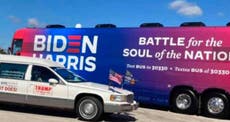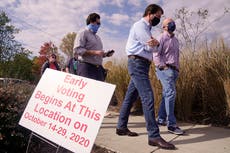US swing states: Trump and Biden return to northern battlegrounds as election day looms
The two nominees are visiting the crucial swing states of Michigan, Pennsylvania and Wisconsin
President Donald Trump stunned the political universe in 2016 with a sweep of critical Northern swing states, winning Michigan, Pennsylvania and Wisconsin by less than one percentage point and forcing Democrats into four years of soul-searching about what went wrong in their historic geographic base.
Four years later, the chilly Midwest looms again as the principal battleground of the election, and Friday Trump and former Vice President Joe Biden crisscrossed the region campaigning in states that are not only must-win for the president but also central to the identities of both parties.
For Democrats, their blue wall in the Midwest was for years their only defence against the Republican Party’s stronghold in the South, a demonstration that they were still the party of labour, working-class families and predominantly black urban centres. For Republicans, these states are a key part of their rural base, and Trump has made his pitch to farmers and white working-class voters here.
As the country reported a record number of coronavirus cases in the past week, Trump continued to insist on Friday that the disease the virus causes was not serious. At a rally in Michigan, a state that reported a 91 per cent increase in new cases from the average two weeks earlier, he made the extraordinary and unfounded accusation that American doctors were profiteering from coronavirus deaths, claiming they were paid more if patients died. He also mocked Fox News host Laura Ingraham, who attended the rally, for wearing a mask. “I’ve never seen her in a mask,” he said. “She’s being very politically correct.”
Biden, in Iowa, took the opposite approach, pointing out the record number of new cases in the state and noting that the Iowa State Fair had been cancelled this year for the first time since World War II. “And Donald Trump has given up,” Biden said.
Later in Minnesota, Biden lashed Trump for his comments about doctors profiting from virus deaths. “Doctors and nurses go to work every day to save lives,” he said. “They do their jobs. Donald Trump should stop attacking them and do his job.”
If Round one of election night will be fought in the Sun Belt – in Southeastern states like Florida, North Carolina and Georgia – Round two will be fought in Pennsylvania and the Midwest. Trailing in most polls and with an increasingly narrow path to victory, Trump has been forced to hold a series of large rallies in states he cannot afford to lose.
That pressure was reflected in the Trump campaign’s last dash, beginning with stops in Michigan, Wisconsin and Minnesota on Friday. Just before Trump took the stage at his first rally in Waterford Township, Michigan, dressed in a black overcoat and black leather gloves, his campaign announced that he would be back in the state for two more rallies Monday, with additional stops in Wisconsin and Pennsylvania the same day.
“He’s sort of trying to repeat the 2016 playbook,” said Charles Franklin, director of the Marquette Law School poll. “He’s coming back to these three states. He did that effectively, surprised us all, and won with that strategy.”
But this time, the landscape is more challenging. Biden led Trump by eight percentage points in Michigan in a recent poll from The New York Times and Siena College, underscoring his troubled standing in Midwestern battleground states where his base of white voters without college degrees appears to be drifting away from him. In Wisconsin, an average of polls shows Biden with a 10-point lead.
Trump campaign advisers, while expressing confidence in the president’s prospects, have pointed to a number of outside factors that make this year more challenging in Northern battlegrounds. The governorships of Michigan, Pennsylvania and Wisconsin are all now held by elected officials they refer to as “anti-Trump Democrats.” Early voting, they concede, is a major “X factor” whose impact is not yet fully understood.
And the pandemic remains a top concern for voters, blunting to an extent the economic gains that Trump had hoped to run on.
Campaign officials point to suburban Milwaukee as one of the few suburban areas across the country that have moved in Trump’s direction since the summer. Unlike other regions, where the issue of law and order has dropped as a top priority, they said it had remained a top priority there, ever since the shooting of Jacob Blake in Kenosha, Wisconsin.
But Franklin, who conducts Wisconsin’s most respected political survey, said his polls did not show that the president was winning over new voters with his law and order pitch. After the president’s visit to Kenosha in September, Franklin said, Republican approval of his response to the protests went up by 21 points. But independents moved up only about three points.
“It’s preaching to the choir, and he gets a strong amen, but it doesn’t add more people in the pews,” Franklin said.
On the campaign trail this week, the president has been more focused on personal feuds than on policy contrasts, and he has insisted that the country was rounding the corner on the virus while scorning public health precautions. On Friday, at his first of three rallies, Trump criticised one of his favourite foils, Gov Gretchen Whitmer, D-Mich., and the crowd chanted in response, “Lock her up.”
“Not me, not me,” Trump said of the chant, while doing nothing to dissuade it. “They blame me every time that happens.”
At his final stop of the day in Rochester, Minnesota, the president stalked off the stage after less than 30 minutes, visibly angry at state restrictions that denied him the large crowd of supporters he prefers. Gov. Tim Walz of Minnesota, a Democrat, has limited gatherings in his state to no more than 250 people.
Trump claimed there were “at least 25,000 people who wanted to be here tonight” and blamed Democratic leaders like Keith Ellison, the state’s attorney general, for preventing his supporters from gathering. Trump claimed his supporters were “barred from entry by radical Democrats.”
He left the stage without his usual finishing flourishes, where he talks about “winning, winning, winning” and dances to the Village People’s “YMCA.”
Biden’s Midwestern swing Friday included stops in Iowa, Minnesota and Wisconsin, an itinerary that showed both the promise and peril of the electoral map for his campaign, with the former vice president playing both offence and defence in a matter of hours.
Iowa dealt Biden a “gut punch” early this year, as he later put it after finishing fourth in the state’s caucuses, and it has not been among the battleground states that his campaign has focused on most closely. Although Iowa voted twice for Barack Obama, it swung sharply to the right in 2016, when Trump won by nine percentage points.
But polls have shown a tight race between Trump and Biden this time, and Trump is slated to travel to the state Sunday for a rally in Dubuque. Biden’s visit also had the potential to boost a Democratic Senate candidate, Theresa Greenfield, who is challenging the incumbent, Joni Ernst, in a tight race.
On a bright fall day, Biden held a drive-in car rally at the Iowa State Fairgrounds in Des Moines, where supporters decorated their cars with Biden signs and honked to show their support for him. Others stood by their cars waving American flags.
Standing outside her minivan, Linda Garlinghouse, 69, was hoping for a big win by Biden – an outcome that would be more likely if Biden wins a state like Iowa. “I’m just hoping for a landslide,” she said, so that there will not be “any doubt cast on the election.”
The New York Times




Join our commenting forum
Join thought-provoking conversations, follow other Independent readers and see their replies
Comments